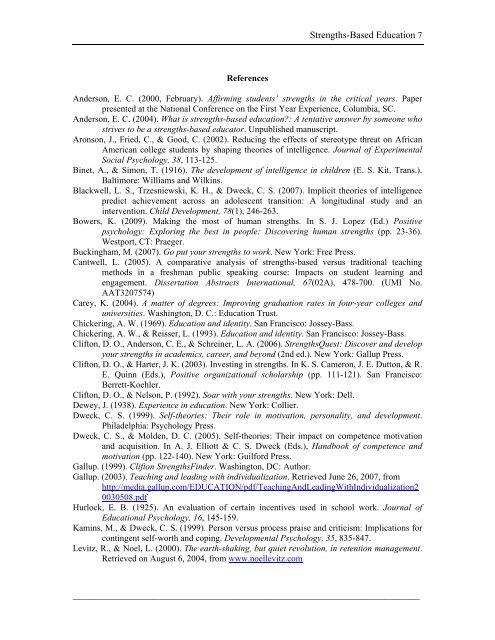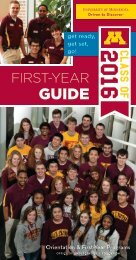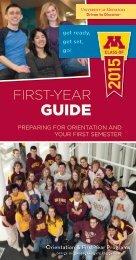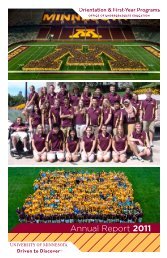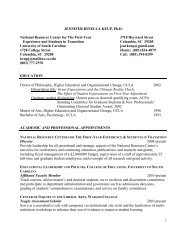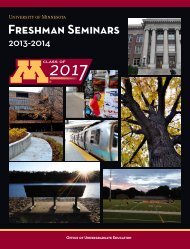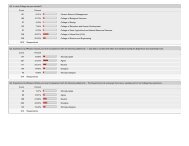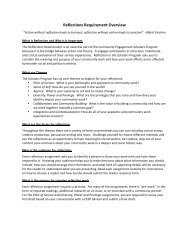The Principles of Strengths-Based Education - Orientation and First ...
The Principles of Strengths-Based Education - Orientation and First ...
The Principles of Strengths-Based Education - Orientation and First ...
You also want an ePaper? Increase the reach of your titles
YUMPU automatically turns print PDFs into web optimized ePapers that Google loves.
<strong>Strengths</strong>-<strong>Based</strong> <strong>Education</strong> 7<br />
References<br />
Anderson, E. C. (2000, February). Affirming students’ strengths in the critical years. Paper<br />
presented at the National Conference on the <strong>First</strong> Year Experience, Columbia, SC.<br />
Anderson, E. C. (2004). What is strengths-based education: A tentative answer by someone who<br />
strives to be a strengths-based educator. Unpublished manuscript.<br />
Aronson, J., Fried, C., & Good, C. (2002). Reducing the effects <strong>of</strong> stereotype threat on African<br />
American college students by shaping theories <strong>of</strong> intelligence. Journal <strong>of</strong> Experimental<br />
Social Psychology, 38, 113-125.<br />
Binet, A., & Simon, T. (1916). <strong>The</strong> development <strong>of</strong> intelligence in children (E. S. Kit, Trans.).<br />
Baltimore: Williams <strong>and</strong> Wilkins.<br />
Blackwell, L. S., Trzesniewski, K. H., & Dweck, C. S. (2007). Implicit theories <strong>of</strong> intelligence<br />
predict achievement across an adolescent transition: A longitudinal study <strong>and</strong> an<br />
intervention. Child Development, 78(1), 246-263.<br />
Bowers, K. (2009). Making the most <strong>of</strong> human strengths. In S. J. Lopez (Ed.) Positive<br />
psychology: Exploring the best in people: Discovering human strengths (pp. 23-36).<br />
Westport, CT: Praeger.<br />
Buckingham, M. (2007). Go put your strengths to work. New York: Free Press.<br />
Cantwell, L. (2005). A comparative analysis <strong>of</strong> strengths-based versus traditional teaching<br />
methods in a freshman public speaking course: Impacts on student learning <strong>and</strong><br />
engagement. Dissertation Abstracts International, 67(02A), 478-700. (UMI No.<br />
AAT3207574)<br />
Carey, K. (2004). A matter <strong>of</strong> degrees: Improving graduation rates in four-year colleges <strong>and</strong><br />
universities. Washington, D. C.: <strong>Education</strong> Trust.<br />
Chickering, A. W. (1969). <strong>Education</strong> <strong>and</strong> identity. San Francisco: Jossey-Bass.<br />
Chickering, A. W., & Reisser, L. (1993). <strong>Education</strong> <strong>and</strong> identity. San Francisco: Jossey-Bass.<br />
Clifton, D. O., Anderson, C. E., & Schreiner, L. A. (2006). <strong>Strengths</strong>Quest: Discover <strong>and</strong> develop<br />
your strengths in academics, career, <strong>and</strong> beyond (2nd ed.). New York: Gallup Press.<br />
Clifton, D. O., & Harter, J. K. (2003). Investing in strengths. In K. S. Cameron, J. E. Dutton, & R.<br />
E. Quinn (Eds.), Positive organizational scholarship (pp. 111-121). San Francisco:<br />
Berrett-Koehler.<br />
Clifton, D. O., & Nelson, P. (1992). Soar with your strengths. New York: Dell.<br />
Dewey, J. (1938). Experience in education. New York: Collier.<br />
Dweck, C. S. (1999). Self-theories: <strong>The</strong>ir role in motivation, personality, <strong>and</strong> development.<br />
Philadelphia: Psychology Press.<br />
Dweck, C. S., & Molden, D. C. (2005). Self-theories: <strong>The</strong>ir impact on competence motivation<br />
<strong>and</strong> acquisition. In A. J. Elliott & C. S. Dweck (Eds.), H<strong>and</strong>book <strong>of</strong> competence <strong>and</strong><br />
motivation (pp. 122-140). New York: Guilford Press.<br />
Gallup. (1999). Clifton <strong>Strengths</strong>Finder. Washington, DC: Author.<br />
Gallup. (2003). Teaching <strong>and</strong> leading with individualization. Retrieved June 26, 2007, from<br />
http://media.gallup.com/EDUCATION/pdf/TeachingAndLeadingWithIndividualization2<br />
0030508.pdf<br />
Hurlock, E. B. (1925). An evaluation <strong>of</strong> certain incentives used in school work. Journal <strong>of</strong><br />
<strong>Education</strong>al Psychology, 16, 145-159.<br />
Kamins, M., & Dweck, C. S. (1999). Person versus process praise <strong>and</strong> criticism: Implications for<br />
contingent self-worth <strong>and</strong> coping. Developmental Psychology, 35, 835-847.<br />
Levitz, R., & Noel, L. (2000). <strong>The</strong> earth-shaking, but quiet revolution, in retention management.<br />
Retrieved on August 6, 2004, from www.noellevitz.com<br />
______________________________________________________________________________


